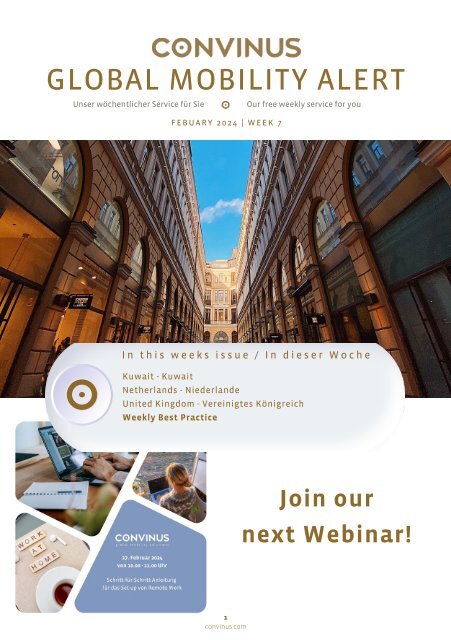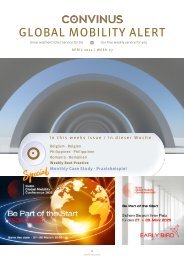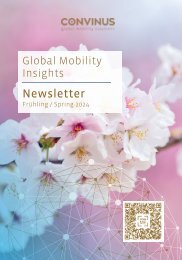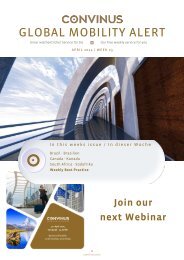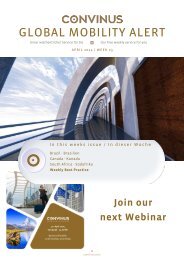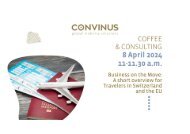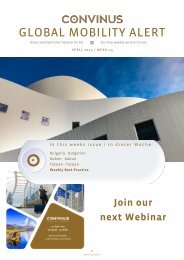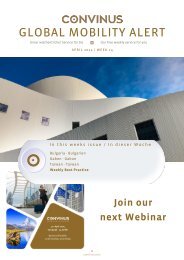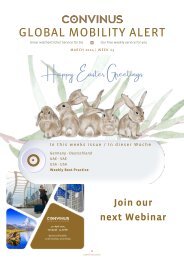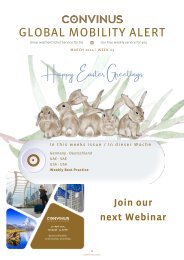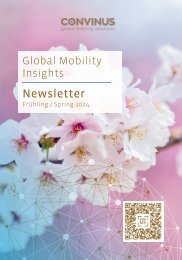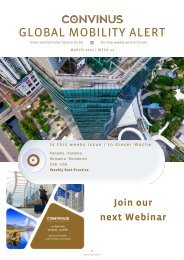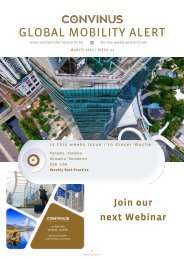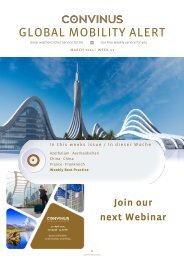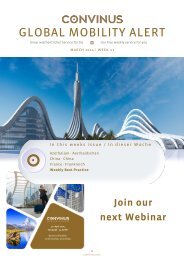CONVINUS Global Mobility Alert - Week 7.2024
You also want an ePaper? Increase the reach of your titles
YUMPU automatically turns print PDFs into web optimized ePapers that Google loves.
GLOBAL MOBILITY ALERT<br />
Unser wöchentlicher Service für Sie Our free weekly service for you<br />
F E B U A R Y 2 0 2 4 | W E E K 7<br />
I n t h i s w e e k s i s s u e / I n d i e s e r W o c h e<br />
Kuwait - Kuwait<br />
Netherlands - Niederlande<br />
United Kingdom - Vereinigtes Königreich<br />
<strong>Week</strong>ly Best Practice<br />
Join our<br />
next Webinar!<br />
1<br />
convinus.com
NEWS UPDATE FEBUARY 15,2024<br />
Kuwait: Reintroduction of the family visa<br />
Kuwait: Wiedereinführung des Familienvisums<br />
Kuwait has resumed issuing expat family visa. End of<br />
January 2024 the Ministry of Interior announced that<br />
applications for family visas for foreigners will resume<br />
on January 28 at all residency departments under new<br />
conditions and standards.<br />
This decision was made upon the directives of Deputy<br />
Prime Minister, Defence Minister and Acting Interior<br />
Minister Faha Yusuf Saud Al-Sabah, the Ministry’s<br />
department of security relations and media said in<br />
statement.<br />
The conditions for an expat to apply for a family visa<br />
for Kuwait include the following:<br />
Must have a monthly salary of at least KD 800<br />
(approximately CHF 2.250 / EUR 2.400 / USD 2.600)<br />
They should have a university degree certificate<br />
They must be employed in the same field as they<br />
studied (as per university certificate).<br />
Kuwait hat die Ausstellung von Familienvisa für<br />
Ausländer wieder aufgenommen. Ende Januar 2024<br />
kündigte das Innenministerium an, dass die<br />
Beantragung und Ausstellung von Familienvisa für<br />
Ausländer bei allen Abteilungen für Aufenthaltsangelegenheiten<br />
am 28. Januar unter neuen Bedingungen<br />
und Standards wieder aufgenommen wurde.<br />
2<br />
convinus.com<br />
Diese Entscheidung wurde auf Anweisung des<br />
stellvertretenden Premierministers, Verteidigungsministers<br />
und amtierenden Innenministers Faha Yusuf<br />
Saud Al-Sabah getroffen, so die Abteilung für<br />
Sicherheitsbeziehungen und Medien des Ministeriums<br />
in einer Erklärung.<br />
Zu den Bedingungen, die erfüllt sein müssen, damit ein<br />
Ausländer ein Familienvisum für Kuwait beantragen<br />
kann, gelten die folgenden:<br />
Sie müssen ein monatliches Gehalt von mindestens<br />
KD 800 (ca. CHF 2’250 / EUR 2’400 / USD 2'600)<br />
haben<br />
Sie sollten einen Universitätsabschluss vorweisen<br />
können<br />
Sie müssen in demselben Bereich beschäftigt sein,<br />
in dem sie studiert haben (laut Universitätszeugnis).
NEWS UPDATE FEBUARY 15,2024<br />
Netherlands: Netherlands approves residence permit expiration extentions<br />
Niederlande: Die Niederlande genehmigt neu die Verlängerung von Aufenthaltsbewilligungen<br />
Since February 15, 2024, nationals who are exempt<br />
from the visa requirement may stay in the Netherlands<br />
for up to 90 days immediately after their residence<br />
permit expires. Prior departure from the Schengen<br />
area, as previously required, is no longer necessary<br />
since the change.<br />
The following points should be noted:<br />
The foreign national does not have to apply for the<br />
90-day visa waiver, but must meet all the<br />
requirements for a short-stay visa.<br />
This new benefit does not apply if the foreign<br />
national's residence permit has been revoked or if<br />
a return decision has been issued. The sponsor (i.e.<br />
the employer, spouse, parent) of the holder of an<br />
expired residence permit is responsible for the<br />
costs of returning to the country of origin for up to<br />
one year after expiry or cancellation.<br />
Seit dem 15. Februar 2024 dürfen sich von der Visumpflicht<br />
befreite Staatsangehörige unmittelbar nach<br />
Ablauf ihrer Aufenthaltsgenehmigung bis zu 90 Tage in<br />
den Niederlanden aufhalten. Eine vorherige Ausreise<br />
aus dem Schengen-Raum ist, wie bisher notwendig,<br />
seit der Änderung nicht mehr erforderlich.<br />
Hierbei sind folgende Punkte zu beachten:<br />
3<br />
convinus.com<br />
Die ausländischen Staatsangehörigen müssen<br />
keinen Antrag mehr für die 90-tägige Befreiung von<br />
der Visumpflicht stellen, sondern müssen alle<br />
Voraussetzungen für ein Visum für einen kurzfristigen<br />
Aufenthalt erfüllen.<br />
Diese neue Vergünstigung gilt nicht, wenn der<br />
Aufenthaltstitel des ausländischen Staatsangehörigen<br />
zuvor entzogen wurde oder wenn eine<br />
Rückführungsentscheidung ergangen ist. Der<br />
Sponsor (das heisst, der Arbeitgeber, Ehegatte,<br />
Elternteil) des Inhabers eines abgelaufenen<br />
Aufenthaltstitels ist bis zu einem Jahr nach Ablauf<br />
oder Annullierung für die Kosten der Rückkehr in<br />
das Herkunftsland verantwortlich.
NEWS UPDATE FEBUARY 15,2024<br />
United Kingdom: Changes to the «UK visitor rule» took place<br />
Vereinigtes Königreich: Änderungen der «UK visitor rule» in Kraft getreten<br />
On January 31, 2024, the changes to the UK business<br />
visitor regulations came into force. The following<br />
changes, which were published on December 7, 2023 in<br />
a statement of changes, expand the range of business<br />
activities that visitors can engage in without requiring<br />
a sponsorship or other category of work permit /<br />
business visa.<br />
Below you will find the latest changes to the «UK<br />
Visitor Rule»:<br />
The scope of permitted activities for intra-group<br />
transferees (who are employed abroad but work in<br />
the UK for a branch or company within the same<br />
group) will be extended to remove the prohibition<br />
on working directly with clients. However, the<br />
client-facing work must now be related to the<br />
visitor's employment abroad and must not amount<br />
to outsourcing a project or service to the overseas<br />
employer.<br />
Permission for aircrew to enter the UK under a civil<br />
aviation authority is now part of the standard<br />
visitor arrangements and no longer an concession<br />
outside the regulations.<br />
Visitors are now permitted to work remotely while<br />
in the UK, although remote working must not be<br />
the main purpose of their visit.<br />
Scientists, researchers and academics can now<br />
carry out research as part of their visit to the UK.<br />
Previously, scientists and researchers could only<br />
undertake independent research, and academics<br />
could only undertake research for their own<br />
purposes if they were on leave from their home<br />
institution. This change does not apply to<br />
academics applying for a 12-month visit visa or<br />
those applying to extend their stay.<br />
4<br />
convinus.com<br />
Zum 31. Januar 2024 sind Änderungen bei den britischen<br />
Vorschriften für Geschäftsreisende in Kraft<br />
getreten. Die folgenden Änderungen, die am 7. Dez.<br />
2023 in einer Erklärung zu den Änderungen veröffentlicht<br />
wurden, erweitern das Spektrum der geschäftlichen<br />
Aktivitäten, denen Besucher nachgehen<br />
können, ohne dass sie eine Bürgschaft oder eine<br />
andere Kategorie von Arbeitsbewilligung- bzw.<br />
genehmigung / Arbeitsvisum benötigen.<br />
Nachfolgend finden Sie die aktuellen Änderungen der<br />
«UK Visitor Rule»:<br />
Der Umfang der erlaubten Tätigkeiten für konzernintern<br />
versetzte Mitarbeiter (die im Ausland<br />
beschäftigt sind, aber im Vereinigten Königreich<br />
für eine Niederlassung oder ein Unternehmen<br />
innerhalb desselben Konzerns arbeiten) wird<br />
erweitert, um das Verbot der direkten Arbeit mit<br />
Kunden aufzuheben. Allerdings muss die Tätigkeit<br />
mit Kundenkontakt nun in Zusammenhang mit der<br />
Beschäftigung des Besuchers im Ausland stehen<br />
und darf nicht darauf hinauslaufen, dass ein Projekt<br />
oder eine Dienstleistung an den ausländischen<br />
Arbeitgeber ausgelagert wird<br />
Die Erlaubnis für Flugpersonal, im Rahmen einer<br />
Zivilluftfahrtbehörde in das Vereinigte Königreich<br />
einzureisen, ist nun Teil der Standard-Besucherregelungen<br />
und nicht mehr ein Zugeständnis<br />
ausserhalb der Vorschriften<br />
Besuchern ist es nun gestattet, während ihres<br />
Aufenthalts im Vereinigten Königreich aus der<br />
Ferne zu arbeiten, wobei die Arbeit aus der Ferne<br />
aber nicht der Hauptzweck ihres Besuchs sein darf<br />
Wissenschaftler, Forscher und Akademiker können<br />
nun im Rahmen ihres Besuchs im Vereinigten<br />
Königreich forschen. Zuvor konnten Wissenschaftler<br />
und Forscher nur unabhängige Forschung betreiben,<br />
und Akademiker konnten nur dann für<br />
eigene Zwecke forschen, wenn sie von ihrer<br />
Heimateinrichtung beurlaubt waren. Diese Änderung<br />
gilt nicht für Akademiker, die ein 12-monatiges<br />
Besuchsvisum beantragen, oder für diejenigen, die<br />
eine Verlängerung ihres Aufenthalts beantragen.
<strong>CONVINUS</strong><br />
Webinare & Seminare<br />
mit Zertifikat für Ihren<br />
Karriere-Booster im<br />
Bereich <strong>Global</strong> <strong>Mobility</strong><br />
Auf folgendes können Sie sich verlassen:<br />
Erstklassige Referenten<br />
Topaktuelle Themen und Praxisfälle<br />
zur anschaulichen Darstellung<br />
Autodidaktisch sehr gut aufbereitete<br />
und ausführliche Foliensätze<br />
Flexibilität (nehmen Sie an einem x-<br />
beliebigen Ort mit Ihrem Laptop teil)<br />
Geringer Zeitaufwand (Webinare 60<br />
Minuten und Seminare 180 Minuten)<br />
Günstige Massnahme zur Fortbildung
BEST PRACTICE<br />
CHAPTER 3: INCOME TAXES FOR REMOTE<br />
WORK ABROAD<br />
GLOBAL MOBILITY: A STEP-BY-STEP GUIDE TO SETTING UP<br />
REMOTE WORK<br />
NORMA REYNOV, <strong>CONVINUS</strong><br />
In the first two chapters of our step-by-step guide to remote work, we first defined the different<br />
forms of remote work and then looked specifically at the associated social security issues.<br />
The following chapter is dedicated to the income tax aspects of remote work. Here, too, we need to<br />
distinguish between the two basic forms of remote work. As already described in Chapter 2, these<br />
are essentially:<br />
1.Remote work with predominant activity at the foreign place of residence<br />
In this case, for example, a Swiss company hires an employee who primarily and continuously works<br />
"remotely" at a foreign place of residence. The employee receives an employment contract with the<br />
Swiss company that is adapted to foreign law. In general, the employee only comes to Switzerland<br />
for a few working days per month and otherwise works from a home office abroad.<br />
2.Remote work as a short-term activity abroad<br />
In these cases, employees generally work in the country of employment. This means that the<br />
employees not only have a Swiss employment contract but also work mainly in Switzerland. If these<br />
employees now wish to work abroad for a shorter period, this is also referred to as "remote work".<br />
This type of remote work is often based on the employee's initiative and desire. The distinction<br />
between this kind of remote work and classic short-term assignments is fluid, and there are many<br />
recognizable parallels.<br />
Version I: Remote work with predominant activity at the foreign place of residence<br />
From the company's perspective, both forms of "remote work" initially involve additional<br />
clarification and, depending on the constellation, considerable administrative steps. In the first<br />
case ("remote work with predominant activity at the foreign place of residence"), it must be clarified<br />
whether the company is responsible for the payment and withholding of income taxes for the<br />
employee who works mainly abroad. This is likely to be the case in most countries. France, Italy,<br />
Poland, and the UK, for example, require income tax to be deducted from wages.<br />
6<br />
convinus.com
BEST PRACTICE<br />
Due to the complexity and country-specific characteristics, in most cases, this cannot be managed<br />
by the foreign employer alone but requires the help of an experienced international payroll<br />
provider, who not only prepares the foreign payslips but also carries out the registration with the<br />
tax authorities and the monthly calculation of the tax burden.<br />
Due to the Swiss employer in our example, the Swiss withholding tax must be calculated for each<br />
occasional working day in Switzerland and remitted to the relevant withholding tax office.<br />
To coordinate the Swiss withholding tax and the taxes owed at the foreign place of residence and<br />
work, the respective country-specific regulations must be observed. This can result in different<br />
procedures depending on the country (e.g. monthly deduction of effective Swiss withholding tax,<br />
definition of a lump-sum withholding tax deduction and correction at the end of the year,<br />
deduction of effective withholding tax at the end of the year).<br />
Due to the considerable effort and legal restrictions, double taxation is only avoided in very few<br />
cases via the payroll (e.g. Germany). In many cases, we only see the correction as part of the annual<br />
income tax return (e.g. France, Poland, or the UK).<br />
Version II: Remote work as a short-term activity abroad<br />
If, on the other hand, remote work is merely a short-term activity abroad and the employee goes<br />
abroad for a few days, weeks or even months, companies tend to be very interested in avoiding<br />
foreign tax liability to minimize the administrative burden.<br />
It is typically possible to avoid foreign tax liability for short-term foreign assignments if all aspects<br />
of the so-called 183-day rule from the respective double taxation agreement (DTA) are observed. In<br />
simple terms, this means that<br />
the employee may not spend more than 183 days per calendar year or 12-month period in the<br />
foreign country in question;<br />
no costs may be borne by the foreign organization (including partial costs such as meals or<br />
accommodation);<br />
no salary may be paid abroad.<br />
In addition, there must be no de facto or economic employer abroad. The definition of this<br />
theoretical construct is country-specific.<br />
7<br />
convinus.com
BEST PRACTICE<br />
Income tax complexity is also the reason why companies often restrict remote work in terms of<br />
time (e.g. up to 30 days) and location (e.g. only in countries with double taxation agreements). From<br />
the perspective of payroll and HR departments, this is understandable, as short-term work abroad<br />
at the employee's request can involve considerable clarification on the part of HR departments,<br />
administrative efforts, and also significant tax aspects in order to make it legally compliant.<br />
Remote work undoubtedly remains a complex matter. Nevertheless, it is worth taking a close look<br />
at this topic. On the one hand, it makes it possible to find qualified specialists abroad, and on the<br />
other, it offers companies the opportunity to position themselves as progressive employers with<br />
corresponding benefits for their employees.<br />
The encouraging news is that the experience of remote working has grown significantly in recent<br />
years. With the support of qualified consultants, companies can find out exactly whether and how<br />
remote working can be implemented in their company.<br />
Chapter 1: A question of definition - What is remote work anyway?<br />
Chapter 2: Social security for remote work abroad<br />
Chapter 3: Income Taxes for remote work abroad<br />
Chapter 4: Work permits for international remote work<br />
Chapter 5 (Monthly Special): Detailed practical cases of remote work for HR departments<br />
regarding income taxes, social insurance, work permits, payroll, and employment contracts.<br />
8<br />
convinus.com
AUS DER PRAXIS<br />
TEIL 3: STEUERN BEI REMOTE WORK MIT<br />
AUSLANDSBEZUG<br />
GLOBAL MOBILITY: SCHRITT-FÜR-SCHRITT-ANLEITUNG FÜR<br />
DAS SET-UP VON REMOTE WORK<br />
NORMA REYNOV, <strong>CONVINUS</strong><br />
In den ersten beiden Teilen unserer Schritt-für-Schritt-Anleitung für Remote Work definierten wir<br />
zunächst die unterschiedlichen Formen von Remote Work und gingen dann konkret auf die damit<br />
verbundenen Sozialversicherungsproblematiken ein.<br />
Der folgende Teil ist den steuerlichen Aspekten von Remote Work gewidmet. Auch hier müssen wir<br />
wieder die beiden grundsätzlichen Formen von «Remote Work» unterscheiden. Wie bereits im Teil 2<br />
beschrieben, sind diese im Wesentlichen:<br />
1.Remote Work mit vorwiegender Tätigkeit am ausländischen Wohnort<br />
In diesem Fall stellt beispielsweise ein Schweizer Unternehmen einen Mitarbeiter ein, der<br />
vorwiegend und dauerhaft an einem ausländischen Wohnort «remote» arbeitet. Der Mitarbeiter<br />
erhält einen Arbeitsvertrag mit der Schweizer Gesellschaft, der an das ausländische Recht adaptiert<br />
ist. Grundsätzlich kommt der Mitarbeiter nur für vereinzelte Arbeitstage pro Monat in die Schweiz<br />
und arbeitet ansonsten im ausländischen Homeoffice.<br />
2.Remote Work als kurzzeitige Tätigkeit im Ausland<br />
In these cases, employees generally work in the country of employment. This means that the<br />
employees not only have a Swiss employment contract but also work mainly in Switzerland. If these<br />
employees now wish to work abroad for a shorter period, this is also referred to as "remote work".<br />
This type of remote work is often based on the employee's initiative and desire. The distinction<br />
between this kind of remote work and classic short-term assignments is fluid, and there are many<br />
recognizable parallels.<br />
Version I: Remote Work mit vorwiegender Tätigkeit am ausländischen Wohnort<br />
Aus Unternehmenssicht sind beide Formen des «Remote Work» zunächst mit einem zusätzlichen<br />
Abklärungsaufwand und je nach Konstellation auch erhebliche administrative Schritte mit sich.<br />
9<br />
convinus.com
AUS DER PRAXIS<br />
Im ersten Fall («Remote Work mit vorwiegender Tätigkeit am ausländischen Wohnort») muss<br />
abklärt werden, ob das Unternehmen für die Abführung und den Einbehalt der Lohnsteuern des<br />
hauptsächlich im Ausland arbeitenden Mitarbeiters verantwortlich ist. Dies dürfte in den meisten<br />
Ländern der Fall sein. So sehen mittlerweile beispielsweise Frankreich, Italien, Polen oder auch<br />
Grossbritannien den verpflichtenden Einkommenssteuerabzug vom Lohn vor.<br />
Aufgrund der Komplexität und der länderspezifischen Besonderheiten ist dies in den meisten Fällen<br />
nicht allein durch den ausländischen Arbeitgeber zu bewerkstelligen, sondern benötigt die Hilfe<br />
eines erfahrenen internationalen Payroll-Providers, der nicht nur die ausländischen Lohnabrechnungen<br />
erstellt, sondern auch die Registrierung bei den Steuerbehörden und die monatliche<br />
Berechnung der Steuerbelastung vornimmt.<br />
Für die vereinzelten Arbeitstage in der Schweiz ist aufgrund des im Beispiel vorliegenden Schweizer<br />
Arbeitgebers für jeden Schweizer Arbeitstag die Schweizer Quellensteuer zu berechnen und an das<br />
zuständige Quellensteueramt abzuführen.<br />
Um die Schweizer Quellensteuern und die am ausländischen Wohn- und Arbeitsort geschuldeten<br />
Steuern zu koordinieren, müssen die jeweiligen länderspezifischen Regelungen beachtet werden.<br />
So kann es je nach Länderkonstellation zu unterschiedlichen Verfahren kommen (z.B. monatlicher<br />
Abzug der effektiven Schweizer Quellensteuern, Definition eines pauschalen Quellensteuerabzugs<br />
und Korrektur am Jahresende, Abzug der effektiven Quellensteuern am Jahresende).<br />
Die Vermeidung der steuerlichen Doppelbelastung erfolgt aufgrund des erheblichen Aufwandes<br />
und der gesetzlichen Vorgaben nur in den wenigsten Fällen über die Payroll (z.B. Deutschland). In<br />
vielen Fällen sehen wir die Richtigstellung erst im Rahmen der jährlichen Einkommenssteuererklärung<br />
(z.B. Frankreich, Polen oder Grossbritannien).<br />
Version II: Remote Work als kurzzeitige Tätigkeit im Ausland<br />
Wenn Remote Work hingegen nur eine kurzzeitige Tätigkeit im Ausland ist und der Mitarbeiter für<br />
einige Tage, Wochen oder auch Monate ins Ausland geht, sind Unternehmen tendenziell sehr daran<br />
interessiert, die ausländische Steuerpflicht zu vermeiden, um den administrativen Aufwand zu<br />
minimieren.<br />
10<br />
convinus.com
AUS DER PRAXIS<br />
Die Vermeidung der ausländischen Steuerpflicht gelingt bei kurzzeitigen Auslandseinsätzen<br />
meistens, wenn alle Aspekte der sogenannten 183-Tage-Regelung aus den jeweiligen<br />
Doppelbesteuerungsabkommen (DBA) beachtet werden. Diese besagt vereinfacht, dass<br />
Sich der Mitarbeiter nicht mehr als 183 Tage pro Kalenderjahr bzw. 12-Monats-Periode im<br />
betreffenden ausländischen Staat aufhalten darf;<br />
keine Kosten von der ausländischen Organisation übernommen werden dürfen (auch keine<br />
Teilkosten wie z.B. Verpflegung oder Unterkunft);<br />
keine Gehaltsauszahlung im Ausland erfolgen darf.<br />
Zudem darf im Ausland kein faktischer bzw. wirtschaftlicher Arbeitgeber vorliegen. Die Definition<br />
dieses theoretischen Konstrukts ist länderspezifisch.<br />
Die steuerliche Komplexität ist auch der Hintergrund, warum Unternehmen «Remote Work»<br />
oftmals zeitlich (z.B. bis zu 30 Tage) und örtlich (z.B. nur in Staaten mit Doppelbesteuerungsabkommen)<br />
einschränken. Aus der Sicht der Payroll- und HR-Abteilungen ist dies verständlich,<br />
da kurzzeitiges Arbeiten im Ausland auf Wunsch des Mitarbeiters mit erheblichen Abklärungen<br />
seitens der Personalabteilungen, administrativen Aufwand und auch wesentlichen steuerlichen<br />
Aspekten einhergehen kann, um es rechtskonform zu gestalten.<br />
Remote Arbeit bleibt zweifellos eine komplexe Angelegenheit. Dennoch ist es lohnend, sich intensiv<br />
mit diesem Thema auseinanderzusetzen. Einerseits ermöglicht es das Finden von qualifizierten<br />
Fachkräften im Ausland, andererseits bietet es Unternehmen die Möglichkeit, sich als fortschrittliche<br />
Arbeitgeber mit entsprechenden Vorteilen für ihre Mitarbeiter zu positionieren.<br />
Die ermutigende Nachricht ist, dass die Erfahrungen mit Remote Arbeit in den letzten Jahren<br />
erheblich gewachsen sind. Durch die Unterstützung qualifizierter Berater können Unternehmen<br />
genau herausfinden, ob und wie Remote Arbeit in ihrem Unternehmen umgesetzt werden kann.<br />
Teil 1: Eine Frage der Definition - Was ist Remote Work überhaupt?<br />
Teil 2: Sozialversicherungen bei Remote Work mit Auslandsbezug<br />
Teil 3: Steuern bei Remote Work bei Remote Work mit Auslandsbezug<br />
Teil 4: Arbeitsbewilligungen für internationales Remote Work<br />
Teil 5 (Monthly Special): Detaillierte Praxisfälle von Remote Work für Personalabteilungen in<br />
Bezug auf Steuern, Sozialversicherungen, Arbeitsbewilligungen, Payroll und Arbeitsverträge<br />
11<br />
convinus.com
GLOBAL MOBILITY ALERT<br />
Unser wöchentlicher Service für Sie<br />
Our free weekly service for you<br />
T H A N K Y O U F O R R E A D I N G<br />
Zurich<br />
Basel<br />
Geneva<br />
Zug<br />
Talstrasse 70<br />
CH-8001 Zurich<br />
Aeschengraben 29<br />
CH-4051 Basel<br />
Postfach<br />
CH-1215 Geneva<br />
Turmstrasse 18<br />
CH-6300 Zug<br />
Tel. +41 44 250 20 20<br />
Fax +41 44 250 20 22<br />
Tel. +41 61 508 20 40<br />
Fax +41 61 508 20 44<br />
Tel. +41 22 508 20 60<br />
Fax +41 22 508 20 66<br />
Tel. +41 41 508 20 70<br />
Fax +41 41 508 20 77<br />
info@<br />
convinus.com<br />
info.basel@<br />
convinus.com<br />
info.genf@<br />
convinus.com<br />
info.zug@<br />
convinus.com<br />
NOTE:<br />
The contents of this newsletter represent only general information and are in no way a<br />
substitute for individual advice. The contents have been selected with great care, but<br />
<strong>CONVINUS</strong> accepts no liability for any damage whatsoever resulting from the use of the<br />
information provided here. The entire content of the newsletter is the intellectual property of<br />
<strong>CONVINUS</strong> and is subject to copyright. Any modification, copying, distribution and public<br />
reproduction of the content or parts thereof requires the prior written consent of <strong>CONVINUS</strong>.<br />
IMPRINT:<br />
Publisher: <strong>CONVINUS</strong> GmbH ∙ Talstrasse 70 ∙ CH-8001 Zurich<br />
Tel. +41 44 250 20 20 ∙ Fax +41 44 250 20 22<br />
info@convinus.com ∙ convinus.com ∙ © <strong>CONVINUS</strong> GmbH<br />
You can also visit us on LinkedIn & Youtube<br />
Legal disclaimer<br />
The content of this presentation is for general guidance only and should by no means be used as a<br />
substitute for an individual consultation with professional accounting, tax, legal or other competent<br />
advisers. While we have made every attempt to ensure that the information delivered with this<br />
presentation has been obtained from reliable sources, <strong>CONVINUS</strong> is not responsible for any errors or<br />
omissions, or for the results obtained from the use of this information. The entire content of this<br />
webinar is the intellectual property of <strong>CONVINUS</strong> and is under copyright. Any modification, duplication,<br />
distribution and public disclosure of the content or parts there of requires the written consent of<br />
<strong>CONVINUS</strong>.<br />
12<br />
convinus.com


